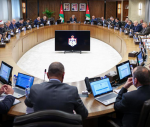You are here
Missing the boat
Feb 25,2016 - Last updated at Feb 25,2016
As expected, the current front runners in the American presidential elections, much as the leaders in the Middle East, are missing the boat as they voice their mediocre views on the Palestinian-Israeli conflict that started in 1948 when the British mandate ended.
An uglier Israeli step followed less than 10 years after, when it occupied the remaining portion of Palestine, known as the West Bank, where the Arab population is still hoping to establish an independent state.
US Democratic Party frontrunner Hillary Clinton, a well-known supporter of Israel, has recently published an article in the National, titled “How I would reaffirm unbreakable bond with Israel — and Benjamin Netanyahu”.
“I have stood with Israel my entire career,” she proclaimed in the article.
Indeed, “as secretary of state requested more assistance for Israel every year”.
Moreover, she added, “I defended Israel from isolation and attacks in the United Nations and other international settings, including opposing the biased Goldstone report [which documented widespread Israeli war crimes in Gaza]”.
Republican front-runner Donald Trump argued on a television programme that he wanted to be “neutral” on Israel and Palestine.
“You understand a lot of people have gone down in flames trying to make that deal. So I don’t want to say whose fault it is — I don’t think that helps.”
It should not be difficult for Trump to point the finger; a report in Quds Net revealed that Israeli authorities issued more than 20,000 demolition orders since the start of the Israeli occupation of Jerusalem.
Director of the Jerusalem Centre for Social and Economic Rights Ziad Al Hammouri revealed: “The Israeli demolition of Palestinian homes is an old-occupation policy, but the new think is mainly targeting the homes of Palestinian martyrs.”
He said he held the international community responsible, since there are international resolutions that protect the Palestinians, but the Israeli occupation does not respect them, and is not held accountable.
He said: “Anyone can observe the changes on the ground which aim to make Jerusalem a capital of the Jewish community.”
Moreover, Human Rights Watch recently revealed that there are 1,000 businesses, mainly manufacturing plants, in the Israeli-occupied West Bank, operating in violation of international law because they are built on occupied land.
Most of these businesses are located in 16 industrial zone. They produce about $600 million of goods annually, a small portion of Israel’s $300 billion economy.
Palestinians under Israeli occupation are often held under administrative detention for indefinite periods. It is the case of a Palestinian journalist who has been on a hunger strike for 90 days, the longest such form of protest in decades.
His doctor, Amani Dayif, who is associated with Physicians for Human Rights-Israel (PHR-I), said that Mohammed Al Qiq, a 33-year-old journalist, is in “unknown territory” medically because of the length of his fast, and that this condition is rapidly deteriorating.
Qiq has been on hunger strike since November 25, 2015, to protest his administrative detention, a policy under which Palestinian inmates are kept in Israeli detention facilities without trial or charge.
The father of two, who used to work for a Saudi Arabian television network, was accused by Israel’s Shin Bet internal spy service of “terror activity” involving Palestinian resistance movement, Hamas.
Qiq denied the charges and began the hunger strike after facing torture during interrogation.
Last Tuesday, the Israeli supreme court dismissed Qiq’s appeal to be transferred to a hospital in Ramallah, where the headquarters of the Palestinian Authority are located, despite UN concern about his critical condition, as described by the International Committee of the Red Cross.
Jordanian civil society groups protested last Sunday outside the United Nations headquarters in Amman, demanding the release of the Palestinian prisoner whose family is not allowed by Israel to visit.
The uproar over the Palestinian journalist under inhumane Israeli arrest coincided with the visit of US Secretary of State John Kerry who regrettably did not bring up his issue with Israel.
Kerry’s failure to intercede in this horrifying case shocked many in Jordan and Palestine.
Since October 1, 176 Palestinians have been killed by Israeli forces while 27 Israelis lost their lives as a result of attacks by Palestinian resistance groups.
Hopefully, His Majesty King Abdullah’s statement that stressed “the need for the international community, and the United States first, to end the stalemate in the peace process between Palestinians and Israelis to move towards a two-state solution” will have some resonance in Washington.
The Middle East cannot wait until a new administration takes over.
The writer is a Washington-based columnist.













